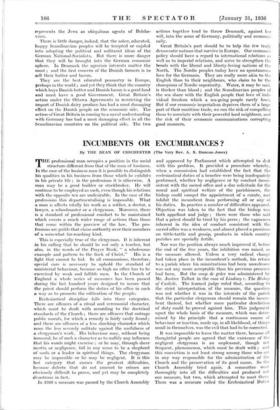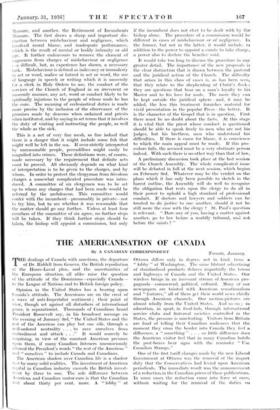INCUMBENTS OB. ENCUMBRANCES ?
By THE DEAN OF CHICHESTER (The Very Rev. A. S. Duncan-Jones) THE professional man occupies a position in the social structure different from that of the man of business. In the case of the business man it is Possible to distinguish his qualities in his business from those which he exhibits in his private life ; in the professions it is otherwise. A man may be a good builder or stockbroker. Ile will 'continue to be employed as such, even though his relations With the opposite sex are undesirable. In the ease of the professions this departmentalising is impossible. What a man is affects vitally his work as a soldier, a doctor, a lawyer, a schoolmaster or a clergyman. Moreover, there is a standard of 'professional conduct to be maintained which covers a much wider range of actions than those that come within the purview of the law. The pro- fessions are guilds that claim authority over their members of a somewhat far-reaching kind.
This is especially true of the clergyman. It is inherent in his calling that he should be not only a teacher, but also, in the words of the Prayer Book, " a wholesome example and pattern to the flock of Christ." His is a light that cannot be hid. In all communions, therefore, special care is necessary to uphold the standard of ministerial behaviour, because so high an office has to be exercised by weak and fallible men. In the Church of England a whole series of measures has been passed during the last hundred years designed to secure that the priest should perform the duties of his office in such a way as to promote the edification of the people.
Ecclesiastical discipline falls into three categories. There are offences of a ritual and ceremonial character, which must be dealt with according to the doctrinal standards of the Church ; there are offences that outrage public morals, for which a remedy is fairly easily found ; and there are offences of a less shocking character which none the less severely militate against the usefulness of a clergyman's work. His behaviour may, without being immoral, be of such a character as to nullify any influence that his words might exercise ; or he may, through sheer inertia or negligence, fail in any sense to be a shepherd of souls or a leader in spiritual things. The clergyman may be impossible or he may be negligent. It is this last category that causes the greatest difficulties, because defects that do not amount to crimes are obviously difficult to prove, and yet may be completely disastrous in fact.
In 1926 a measure was passed by the Church Assembly and approved by Parliament which attempted to .deal With this' problem. It provided a' procedure whefeby, when a commission had established the fact that the ecclesiastical duties of a benefice were being inadequately performed, whether by negligence or by conduct' incon- sistent with the sacred office and a due. solicitude for the moral and spiritual welfare of the Parishioners, the bishop could compel the appointment of a eurate, and inhibit the incumbent from performing all or any of his duties. In practice a number of difficulties appeared. Objection was taken to the fact that the biShop Was -both appellant and judge ; there were those who said that a priest should be tried by his peers ; the vagueness inherent in the idea of conduct consistent with 'the sacred office was a weakness, and almost placed a premium on tittle-tattle and gossip, products in which country parishes are specially fertile.
Nor was the position always much improved if, before the end of the five years, the inhibition was raised, as the measure allowed. Unless a very radical change had taken place in the incumbent's outlook, his return to a parish where his ministrations had been unwelcome was not any more acceptable than his previous presence had been. But the coup de grdce was administered by Mr. Justice Talbot in the case of Lindsay v. The Bishop of Carlisle. The learned judge ruled that, according to the strict interpretation of the measure, the question was not whether it was in the interests of the parish that the particular clergyman should remain the incum- bent thereof, but whether some particular dereliction of duty could be proved against him. This judgement upset the whole basis of the measure, which was deter- mined by the principle that a continuous course of behaviour or inaction, made up, in all likelihood, of things small in themselves, was the evil that had to be corrected.
It was impossible to leave the matter there, because all thoughtful people are agreed that the existence of the negligent clergyman is an unpleasant, though not frequent, phenomenon, which must be dealt with ; and this conviction is not least strong- among those who are in any way responsible for the administration of the Church and the preservation of its good name. So the Church Assembly 'tried again. A committee went thoroughly into all the difficulties and produced not one measure, but two, which attempted to meet them. There was a measure called the Ecclesiastical' -Duties Measure, and another, the Retirement. of Incumbents Measure. The first draws a sharp and important idis- tinetion between misbehaviour and negligence, which involved moral blame, and inadequate performance, which is the result of mental or bodily infirmity or old age. It further endeavours tp remove the element of vagueness from charges of misbehaviour or negligence —a difficult, but, as experience has shown, a necessary task. Misbehaviour is defined as indecency or immodesty in act or word, malice or hatred in act or word, the use of language in speech or writing which it is unseemly far a clerk in Holy Orders to use, the conduct of the services of the Church of England in an irreverent or unseemly manner, any act, word or conduct likely to be spiritually injurious to the people of whose souls he has the cure. The meaning of ecclesiastical duties is made more precise by the inclusion of the observance of the promises made by deacons when ordained and priests when instituted, and by saying in set terms that it involves the duty of visiting and instructing the people, as well the whole as the sick.
This is a net of very fine mesh, so fine indeed that there is a danger that it might include some fish that might well be left in the sea. If over-strictly interpreted by unreasonable people, peccadilloes might easily be magnified into crimes. These definitions were, of course, made necessary by the requirement that definite acts must be proved.. All obviously depends on what kind of interpretation is to be given to the charges, and by whom. In order to protect the clergyman from frivolous charges a somewhat complicated procedure was intro- duced. A committee of six clergymen was to be. set up to whom any charges that had been made would be referred . by the archdeacon. This committee would confer with the incumbent—presumably in privatenot to try him, but to see whether it was reasonable that the matter should go any further. Unless at least four members of the committee of six agree, no further steps will be. taken. If they think further steps should be taken,' the bishop will appoint a commission, but only if the incumbent does not elect to be dealt with by the bishop alone. The procedure of a commission would be different in cases of misbehaviour or of negligence. In the former, but not in the latter, it would include, in addition to the power to appoint a curate to take charge, a power also to declare the benefice void.
It would take too long to discuss the procedure in any greater detail. The importance of the new proposals is the clear distinction that is drawn between the pastoral and the juridical action of the Church. The difficulty that arises in this class of cases is, as has been seen, that they relate to the shepherding of Christ's Hoek ; they are questions that bear on a man's loyalty to his Master and to his love for souls. The more they can be kept outside the juridical sphere—and, it may be added, the less this treatment furnishes material for vivid presentation in the popular Press—the better. It is the character of the Gospel that is in question. First there must be no doubt about the facts. At this stage it is vital that the priest whose conduct is questioned should be able to speak freely to men who are not his judges, but his brethren, men who understand his difficulties. If there is cause for blame, it is conscience to which the main appeal must be made. If this pro- cedure fails, the accused must be a very obstinate person indeed. With such there is no other way than that of law.
A preliminary discussion took place at the last session of the Church Assembly. The whole complicated issue will be debated in full at the next session, which begins on February 3rd. Whatever may be the verdict on the plans which it has only been possible to sketch in the barest outline, the Assembly will do well to recognise the obligation that rests upon the clergy to do all in their power to uphold a high standard. of professional conduct. If doctors and lawyers and soldiers can be trusted to do justice to one another, should it not be still more the case with the clergy ? St. Paul's question is relevant. " Dare any of you, having a matter against another, go to law before a worldly tribunal, and not before the saints ? "











































 Previous page
Previous page